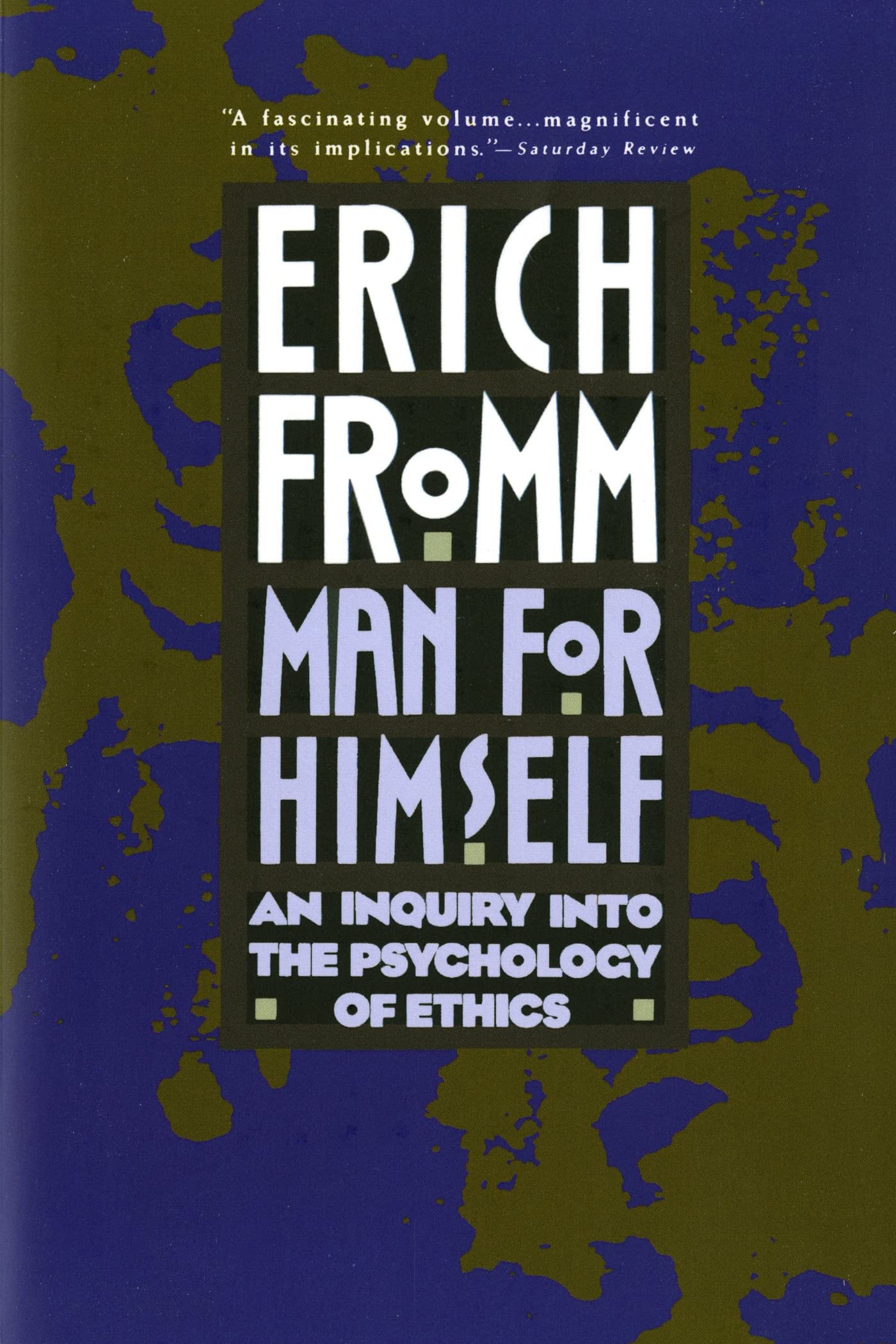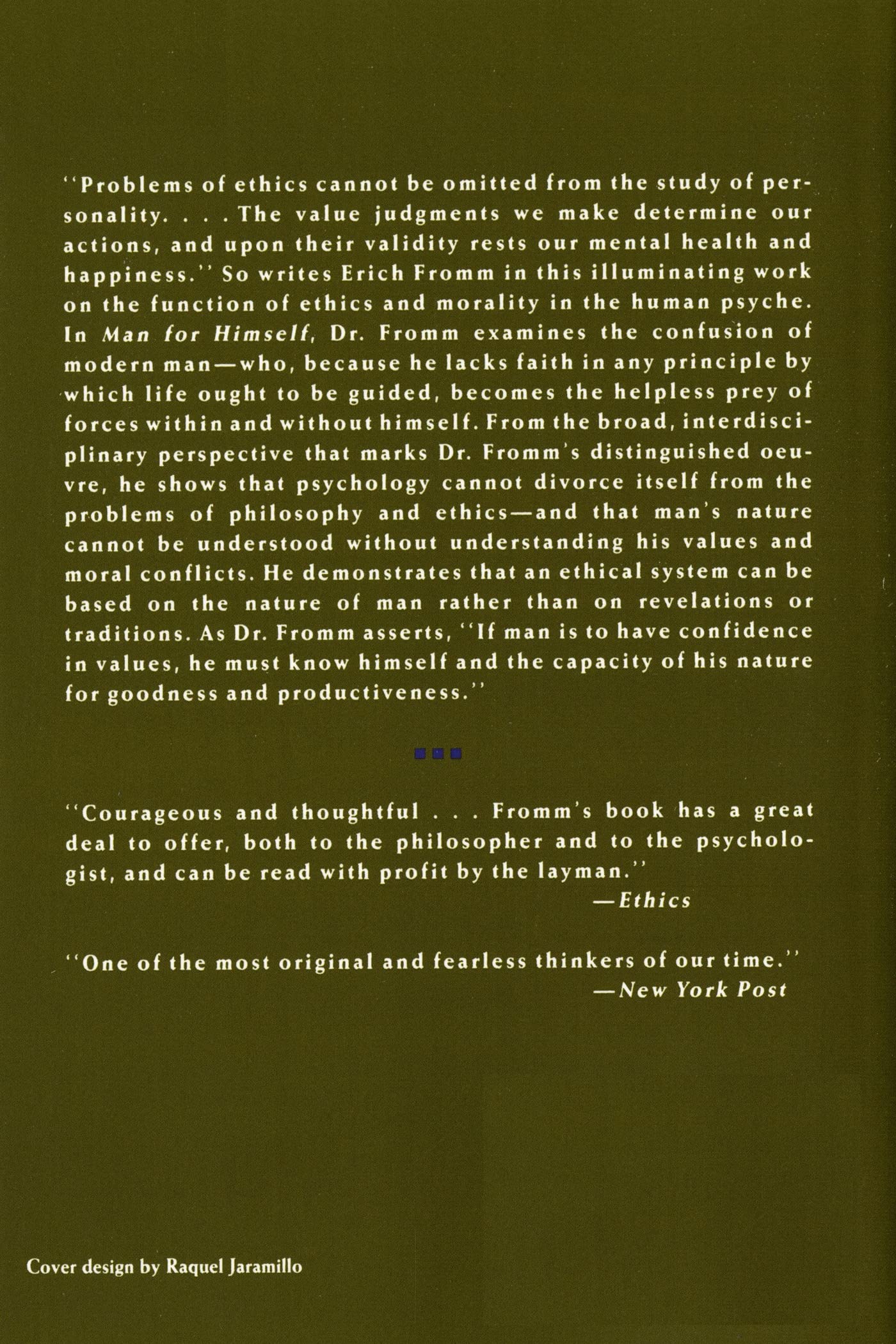Customer Services
Copyright © 2025 Desertcart Holdings Limited
Desert Online General Trading LLC
Warehouse # 7, 4th Street, Umm Ramool, Dubai, 30183, Dubai



Full description not available
W**Y
The Ethics of Secular Humanism
At about the age of 23 I discovered for the first time that I had a mind. Previous to that, I had been more-or-less incapable of any sort of introspection. Smoking marijuana opened my unconscious mind and I felt like I was able to step outside of myself and see myself for the first time. I immediately started reading books other than adventure novels. One of the first authors I discovered was Eric Fromm. His thinking completely galvanized me. I thought that he had figured out all human problems, and all people had to do was pay attention. I knew essentially nothing about Freud, Jung, Marx, Nietzsche, and so on, and Fromm synthesized all of their thinking into a coherent system. Fromm championed the bogey-man of right-wing Christianity, namely secular humanism. The idea of which is that the foundations for value systems should be based on man’s autonomy and reason. In order to know what was good for man, one has to know the nature of man. Authoritarian ethics is an irrational system based on acquiring power over people. This strikes me as so self-evident that it’s incredible that it could arouse controversy. Fromm claims that one of the best tools for knowing human nature is psychoanalysis.These days Freud’s ideas are commonly held to be erroneous, and some critics dismiss Fromm’s ideas as he relies upon ideas of Freud. This is nonsense. Freud was one of mankind’s greatest geniuses. While it is true that his motivations discoveries he made regarding human nature were physiologically clockwork, following the prejudices of his time, Fromm acknowledged this. Too completely dismiss Freud’s ideas on this basis would be like denouncing Kepler’s equations because he thought that planetary motion was caused by the “Holy Spirit,” or Newton’s theory of gravity because he explained it in terms of action at a distance.Rereading Fromm forty some years later, I am astonished at the extent to which he and I think alike. No doubt, this is because I devoured his work at an impressionable time of my life. So I still think that his ideas should be taught in high school. One thing I’ve become convinced of over the years is that irrational devotion to dogma is most often the source of evil, whether the dogma is religious or political. Teaching young people to not enslave their minds to authoritarian dogma is simply sane.
J**I
Si quieres comprender el presente ...nada mejor, conocer el pasado.
Una relectura de la obra de Erich Fromm, después de la primera, "The Sane Society", transcurridos casi sesenta años, permiten avizorar el futuro. He adquirido, recientemente, tomos faltantes en mi biblioteca personal, de la producción psicosocial de dicho autor, claves, del siglo pasado...para interpretar mejor la realidad del mundo globalizado actual. He sido afortunado, como en este caso, "Man for Himself", encontrarme un ejemplar usado en tan buenas condiciones como lo indicaba la oferta del vendedor y recibido en tiempo oportuno.
D**N
A fine example of optimism
In this book the author gives an overview of his thinking on humanistic ethics, which is interesting from a speculative/philosophical viewpoint, but falls somewhat short if viewed from a scientific perspective. The book has an optimistic tone, as do many others by the author, and this makes the reading more palatable. If the ideas in it could be fleshed out with real scientific analysis, with supporting data, it would be a significant advance in the study of human psychology.The author explains his optimism, interestingly, by reference to his experience with patients in his psychoanalytic practice. He speaks of encountering the strength of the strivings for happiness and health exhibited by his patients, which he believes is the natural embodiment of humans. "There is less reason", he says, "to be puzzled by the fact that there are so many neurotic people than by the phenomenon that most people are relatively healthy in spite of the many adverse influences they are exposed to". The statistics supporting this are overwhelming, and without a doubt are on the side of optimism.The book is not a "pop-psychology", "self-help" book though, but instead a theoretical attempt to shed light on the problem of ethics and psychology. The author's goal is to get the reader to ask questions, and not to expect to find advice on how to obtain "happiness". The author's main goal is to find a validation for humanistic ethics that does not collapse into moral relativism but is based upon human nature and human's inherent qualities. The character structure of the mature and "integrated personality" is the origin of virtue, and vice originates from the ignoring of the self and "self-mutilation". To have confidence in values, the author argues, one must know oneself and be aware of one's capacity for doing good and being a productive human being.The author carefully distinguishes between humanistic and authoritarian ethics, with the ethical norms of the former originating from humans themselves, while the latter some other entity. It is important for him to clarify the definition of "authority", one being "rational" authority, whose source is "competence", and "irrational" authority, whose source is always power over people. Rational authority he says, is based on the equality of the authority and the subject, with both of them differing only in the skill level in their respective fields and always having mutual respect for each other. Irrational authority on the other hand is based inherently on inequality, and denies the human capacity to know what is good or bad.In humanistic ethics, as the author sees it, is formally based on the principle that only humans can determine the criteria for good and evil, and completely rejects any transcendent source of values. What is "good" is what is good for humans, and the "bad" is what acts to their detriment. Humanistic ethics, far from suppressing individuality and self-realization, encourages it, and there is no room in it for ethical doctrines that do not take into account the needs and nature of human beings. It is a life-affirming ethical philosophy, one that taps the human capacity for genius, and encourages responsibility for one's own existence. The crippling of human powers is the ultimate vice.The problem then for humanistic ethics is to find out exactly what humans do in fact need in order to develop a healthy psychology. Throughout the book, the author attempts to characterize what such a psychology would be. In many instances throughout the book he makes some unexpected commentary, if judged by the overall theme of optimism in the book. For example, he views the human capacity for reason as both a "blessing" and a "curse". Viewing reason as a distinctly human capacity, not shared by other organisms (and this is troubling from the standpoint of current evidence to the contrary from biology), the author puts humans into a state of "constant and unavoidable disequilibrium". No matter what the level of accomplishment, humans will always be discontented and perplexed, and consequently driven to find new solutions, resulting in an endless restless cycle of achievement and discontent. But many humans do not fit into his sweeping generalizations here, but instead are very contented with their lives on this planet, and find the challenge of life fascinating, and who mourn only the prospect of it ending.Because of his professional status as a psychoanalyst, it is not surprising perhaps to see a somewhat elaborate classification of what constitutes a healthy versus a non-healthy personality. There are "receptive", "exploitative", "hoarding", and "marketing" characters, which are non-productive and signs of personality "disorder" in his view. He gives detailed descriptions of these different types, but unfortunately does not quote case studies or any studies in the literature to support his views. Do individuals who have these personalities find it difficult to live and adjust in soceity? The author would probably argue that such an "adjustment" could be done, but that by itself does not mean that the individual at hand is not following a healthy course of action. The author seems to be getting quite dogmatic in his classifications here, and leaves the reader with a somewhat narrow view of what constitutes a truly healthy personality.With more scientific research and justification put into his ideas, the author could have given the reader a more accurate view of what constitutes a healthy, integrated personality. The book is a good start though, philosophically speaking. Sometimes philosophy can encourage further scientific research, and sometimes it can clarify the issues involved in such research, but it can never take the place of science. The author's optimistic view of human nature is, to repeat, totally justified from a statistical point of view. And his view is somewhat rare, surprisingly, if one examines the statistics: the vast majority of humans are healthy, productive, and proud of their inner capacity for genius, and are without doubt fine examples of the humanistic ethic.
C**N
Amazingly shines a light on Washington, D.C. todday
Fromm's ideas are timeless. His psychological, philosophical and political insights are more valuable today as our society faces the problems of growing inequality. He shows that the superficial self-help industry and the corporate advertising complex see us as easy prey for the quick fixes they offer as solutions for the deep struggles we face as a society and as individuals.This book demonstrates that we all have the ability to understand our own needs and society's needs on a deeper level. Simply having faith in our potential to develop our talents and combining our skills cooperatively with others will improve our society and our own mental health.
Trustpilot
2 weeks ago
1 month ago